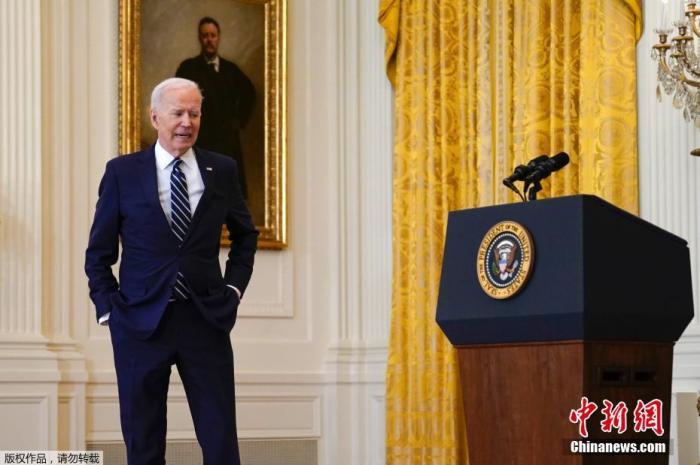China News Agency, Washington, October 21 (Reporter Chen Mengtong) Although the first government budget expenditure bill in his tenure has reached a deadlock in Congress, US President Biden is still optimistic in his dialogue with voters on the 21st that the two parties in Congress can Reach an agreement.
On March 25, local time, U.S. President Biden held the first official press conference in more than 60 days since taking office, answering hot issues such as the border crisis, gun control, and infrastructure plans.
Biden participated in a televised voter dialogue in Baltimore, Maryland that night.
He was asked at the beginning whether Congress could pass the spending bill for the 2022 fiscal year in early November.
"Biparty cooperation and compromise are still possible," Biden gave a positive answer.
The Democrats of the United States Congress launched a US$3.5 trillion budget framework for the 2022 fiscal year in August this year. It plans to increase investment in education, medical insurance, and climate change. Corporate tax increases.
However, due to differences within the Democrats and obstruction by the Republicans, this spending bill was forced to "slim down" to $2 trillion.
Even so, there are still differences within the Democratic Party.
"When you are the President of the United States and there are 50 Democratic senators, each of them is the'President'." Biden said of his economic agenda, "So you have to solve the problem."
But there is not much time left for Biden to solve the problem.
If the two parties in Congress cannot reach an agreement on the budget and debt ceiling for the new fiscal year before December 3, the US federal government will once again face the double risk of government shutdown and debt default.
Regarding this "shrinked" version of the spending bill, the deadlock in the negotiations is currently concentrated within the Democratic Party.
The Associated Press pointed out that the key elements of its changes include cutting social welfare and climate change projects, and reconsidering new taxes on companies and the wealthy.
The former violated Biden's campaign promises, and the latter was firmly opposed by the moderate Democrats represented by Senator Joe Manchin of West Virginia.
In the 90-minute dialogue, most of the questions that voters throw at Biden are related to their own personal interests.
Although there were seats on the podium, Biden stood up and answered all the questions.
Issues such as education, taxation, employment, inflation, oil prices, and supply chain shortages all depend on the smooth implementation of Biden's economic agenda.
Biden said that the core of his economic agenda is to support the American middle class.
He reiterated the parenting tax credit plan, middle-class families will not have to pay more than 7% of their income for childcare expenses.
Regarding the current shortage in the supply chain, Biden said that he will ensure that the major cargo ports in the United States operate around the clock, and if necessary, will consider sending the National Guard to solve the shortage of capacity.
When talking about the new crown epidemic, Biden once again expressed support for the practice of compulsory vaccination.
"I waited until July to discuss the vaccination order because I have tried all possible methods. The effect of mandatory vaccination is showing."
The American media believes that Biden’s response to voters’ questions that night precisely reflected the challenges that the White House faced in reconciling the differences within the Democratic Party in Congress.
CNN pointed out that voters asked questions one after another, focusing on "what's not, not what's in the spending bill."
For Biden, the real challenge is not to win over Republicans in Congress, but how to win the support of the moderate Democrats.
(over)

